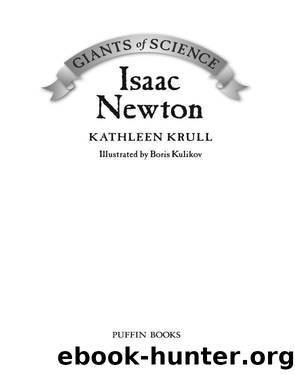Isaac Newton by Kathleen Krull

Author:Kathleen Krull
Language: eng
Format: epub
Publisher: Penguin Young Readers Group
Published: 2010-02-26T00:00:00+00:00
In fact, Hooke had been one of his influences. But now he charged that Hookeâs ideas were ânot only insufficient, but in some respects unintelligible.â
Hooke made the mistake of writing back, and the more he wrote, the more enraged Newton became. He answered Hookeâs objections carefully and, at first, patiently, but later with growing irritation. Newton typically made twenty or thirty drafts of a single document, using a quill pen to cover pages in his tiny spidery handwriting. Dealing with Hooke was taking up valuable time.
His fear of publicity grew worse. His only recourse, as he saw it, was to stop publishing his findings. âI see a man must either resolve to put out nothing new or to become a slave to defend it,â he pouted.
Over the years, Newtonâs relations with Hooke deteriorated further. In a classic case of the pot calling the kettle black, he once accused Hooke of being âa man of strange unsociable temper.â
Yet circumstances in the small world of English science demanded that the two men try to remain civil. They continued to exchange letters with a veneer of courtesy. But Newton turned away from the Royal Society, which he associated with Hooke. The quarrel was kept alive for thirty-one years. It ended only with the death of Robert Hooke.
Certainly one could say that Newtonâs reaction to criticism was childish, even irrational. It was also bad for science. Sharing ideas is a critical part of the scientific progress. But ever since he had spent so much time alone as a boy, Newton liked to spin in his own orbit. Now he went into genuine mourning over the loss of his âformer serene liberty.â
The result was that he failed to engage with other leading scientists, perhaps impeding his own and othersâ progress. He would not let others stand on his shoulders.
Most importantly, Newton delayed the publication of Opticksâthe full account of his revolutionary theory of light and colorâfor some thirty years, all the way until 1704. The year was no coincidenceâHooke had died in 1703.
Download
This site does not store any files on its server. We only index and link to content provided by other sites. Please contact the content providers to delete copyright contents if any and email us, we'll remove relevant links or contents immediately.
The Mayflower and the Pilgrims' New World by Nathaniel Philbrick(4502)
I'm Still Scared by Tomie dePaola(4384)
Bloody Times by James L. Swanson(4371)
Pocahontas by Joseph Bruchac(4259)
Bomb: The Race to Build--And Steal--The World's Most Dangerous Weapon (Newbery Honor Book) by Steve Sheinkin(3961)
Flesh and Blood So Cheap by Albert Marrin(3838)
An American Plague by Jim Murphy(3766)
Little Author in the Big Woods by Yona Zeldis McDonough(3517)
The Giant and How He Humbugged America by Jim Murphy(3446)
Hello, America by Livia Bitton-Jackson(3168)
The President Has Been Shot!": The Assassination of John F. Kennedy by Swanson James L(3101)
Harry Potter: A History of Magic by British Library(3048)
The Landing of the Pilgrims by James Daugherty(2944)
Gettysburg by Iain C. Martin(2834)
The Extraordinary Suzy Wright by Teri Kanefield(2718)
Ben Franklin's Almanac by Candace Fleming(2530)
The Impossible Rescue by Martin W. Sandler(2343)
Bloody Times: The Funeral of Abraham Lincoln and the Manhunt for Jefferson Davis by James L. Swanson(2122)
Who Was Louis Braille? by Margaret Frith(1981)
